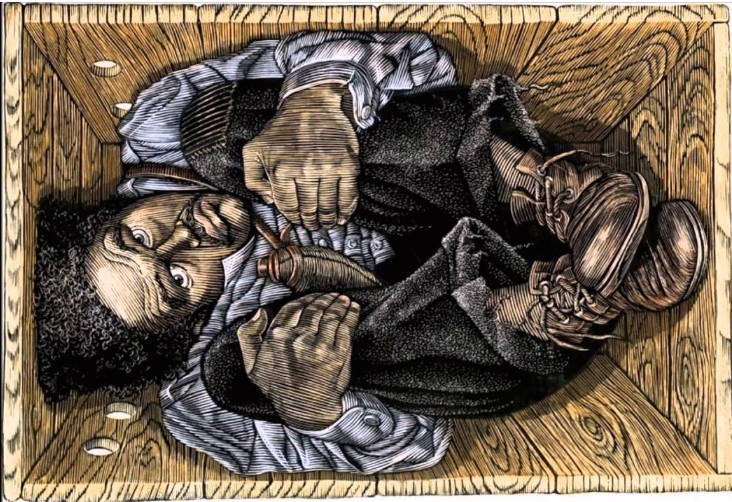When I first came across the story of Henry “Box” Brown tears formed in my eyes thinking about the 26 hours that he endured bent up in a wooden shipping box from Virginia to Philadelphia. In 1815 Brown was born into slavery on a plantation in Virginia. Once he was 15 he was sent to Richmond to work in a tobacco factory where he worked until he got married and had four children. As a slave he was unable to live with his family and after they’d been sold to another plantation in North Carolina, Brown’s rage fueled his desire to escape.
The Role of the Church, Uniting Activists
Many slaves were restricted from leaving their plantation without permission, but the church was a place that many slaveowners didn’t feel intimidated by and allowed their slaves to go to regularly. Whites believed that access to the church kept slaves calm and well-mannered. While at church Brown with the help of another member, James Caesar Anthony Smith, arranged his escape in the form of shipped cargo to Philadelphia where slavery had been phased out from 1740 to 1804 by Pennsylvania’s Act for the Gradual Abolition of Slavery. Henry and James recruited a white man, Samuel Smith, who delivered the package labeled “dry goods” on March 23, 1849. The box was mildly prepared for Brown’s travel with a single air hole.
After his safe arrival into freedom, James and Samuel attempted to ship more slaves, but after their plan was discovered both men were arrested. Though Frederick Douglass believed that the escape method shouldn’t be publicized, Brown could not help but share his experience with the hope of encouraging others to be bold and take the same level of risk to attain their freedom. He spoke at the New England Anti-Slavery Society Convention in Boston and continue to tour before publishing his story, Narrative of the Life of Henry “Box” Brown. Brown’s self written narrative became one of the most popular slave narratives in American history.

Spreading the Message in Public Platforms, Print & Performance
Understanding that his target audience most likely would not have the ability to attend the events he spoke at or some not even having the ability to read, Brown adapted his story into a stage performance. The show, “The Mirror of Slavery” premiered in Boston in 1850. Later, during the Fall of that year the passage of the Fugitive Slave Act required that escaped slaves be returned to their owners. The act had a detrimental effect on Brown’s tour and like many former slaves, he moved to England fearing that he would be arrested and returned into slavery. It wasn’t until 25 years later that he came back to the United States and continued touring the country telling his story orally in in performance.
Henry “Box” Brown’s determination to spread the message of thinking ‘outside the box’ for those seeking their freedom is admirable. Not only did Brown make the dangerously courageous decision to speak to audiences about the methods of his escape, he also toured the country, wrote a book and developed a stage production to further amplify his message. Henry’s extremely dangerous and uncomfortable 26 hour experience in a wooden box was could have resulted in his being terribly injured, misdirected on route or returned to his owner. Throughout the entire day and night that he spent balled up in transit imagine the thoughts that passed through his mind. He may have felt brave, terrified, or both depending on the hour, but he preserved because of his determination
The determination for liberation is human nature. Humans, innately free willed and thinking beings, need to be able to practice their will in order to develop themselves and their thinking. Rather than being retaliated against for seeking a pathway of expression and freedom, people should be provided with resources to meet those needs. For example, rather than prisoners being punished for ‘vandalizing’ the walls of their cell; they should be provided with art classes where they can develop different methods of artistic expression. Slaves (former chattel slaves and modern day incarcerated people) as intelligent human beings eventually realize that their displacement when oppressed and cannot help but to resist against their conditions. Sadly, even today those suffering under the weight of oppression believe that their needs are being met as Harriet Tubman implied, “I could have freed a thousand more if only they knew they were slaves.” Henry “Box” Brown’s risky travels were the result of someone who not only knew that he was enslaved, but who also knew that he was meant to be free.

